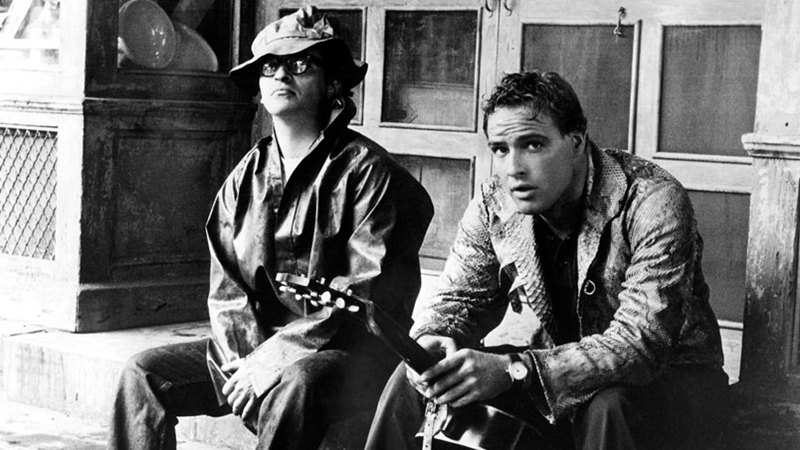“No means no. Isn’t that what we tell women? Do men deserve less?”
Uh-oh. It’s another Michael Douglas character having trouble with women. You’d think his screen characters would have learned better by the time of this film, having already been threatened in “Fatal Attraction” and “Basic Instinct.” Nevertheless, 1994’s “Disclosure” throws enough twists into the scheme of things to provide an imaginative and entertaining couple of hours.
After Glenn Close and Sharon Stone terrorized him previously, it’s now sweet, innocent little Demi Moore who’s out to get him in “Disclosure.” However, it’s a newly buffed and augmented Demi Moore, so she’s a formidable opponent.
While the themes this time involve sexual harassment and corporate intrigue rather than outright blood and mayhem, the results are much the same, with the film building a good deal of suspense and tension. Sure, it’s also more than a little far-fetched, and because of a role-reversal gimmick, it does no favors to women’s lib; yet it keeps a viewer moving along with it. The movie fascinates one, mainly, especially in its double-dealing espionage angles, sort of the way “All the President’s Men” or “Three Days of the Condor” kept one involved, although nowhere near as good as those films.
The story centers around a Seattle computer company executive, Tom Sanders (Michael Douglas), who gets passed over for a big promotion. Instead, the company’s chief, Bob Garvin (Donald Sutherland), who “treats everybody like dirt,” gives the job to an outsider, Meredith Johnson (Demi Moore). Why? Who knows; maybe he just likes her looks. The thing is, Tom and Meredith had an affair many years earlier, before Tom got married to a lovely wife (Caroline Goodall) and had two lovely children. So, why is their previous relationship important? Because Meredith isn’t with the company more than a short while before she tries to seduce Tom in her office. Tom, being a man and being weak in the area of sexual advances (as we’ve seen with Douglas’s prior screen characters), at first goes along with her game, saying no but hardly resisting. When things get too far advanced for him, though, he says no and means it, throwing her off him and walking out of the office. Rejection so infuriates Meredith that she determines to get even. Did she try to seduce him because she’s still carrying a grudge for Tom’s dumping her? Who knows. All we do know is that she’s really, really ticked off. And now, as Tom’s boss, she has the power to do something about it.
There are some clever twists and turns as the story develops into a full-fledged psychological thriller, and Meredith begins a plot to sabotage and destroy Tom. To defend himself, Tom decides to sue Meredith for sexual harassment before she gets him fired.
Meanwhile, the company is in the midst of a huge, multimillion-dollar merger, and the big boss, Garvin, can’t have a scandal on his hands. He only wants both parties to come to terms out of court and out of the public eye. Fair enough, even if it appears he’s secretly on Meredith’s side. In fact, almost everyone is on Meredith’s side. Especially when she gets to Tom’s friends and colleagues, threatening them if they don’t side with her. No one can afford to lose a good job. Besides, who would believe Tom, a disgruntled employee passed over for a promotion that went to the very person he says tried to rape him? It looks to most observers, even to Tom’s wife, who is understandably riled, jealous, and disappointed about the encounter, as though his case is either one of sour grapes or an attempt to rekindle an old flame.
So Tom, finding himself stuck, hires one of the best lawyers in the city, Catherine Alvarez (Roma Maffia), to press his case.
Like so many thrillers, however, this one turns on a coincidence that’s too good to be true. And it doesn’t end there. The climax also becomes too pat, with a next-to-ending scene right out of a James Bond adventure; it’s so silly it doesn’t seem to fit in with the rest of the reality that went before. Then we remember that screenwriter Paul Attanasio based his script on a novel by Michael Crichton, who gave us stories like “Jurassic Park,” “Westworld,” “Coma,” “Looker,” and “The Andromeda Strain,” and suddenly it begins to make sense.
Nevertheless, director Barry Levinson, an old hand at producing slick films we enjoy and believe in (“Diner,” “The Natural,” “Good Morning, Vietnam,” “Rain Man”), moves matters along at a healthy clip. Moreover, he utilizes a fine supporting cast with Dylan Baker as a flunky for Garvin the big boss; Rosemary Forsyth as one of Tom’s coworkers, who seems to know more than she lets on; Dennis Miller as another coworker who may not be too loyal to anyone but himself; and others who contribute to the film’s overall effectiveness.
A viewer certainly shouldn’t interpret “Disclosure” as anything more than another Hollywood sizzler, a highly melodramatic and perhaps opportunistic look at a couple of topical themes; that said, it’s also a lot of fun. Now, I have to end with an admission: For the life of me, I couldn’t actually follow the complications of the plot, particularly all the motivations of the characters. But it’s one of those movies where all the details don’t matter as much as the total picture and the final outcome. Whether you can follow the intricacies of the plot or not, Levinson and his Michael Crichton story carry us along in spite of ourselves. I mean that as a compliment.
Video:
Among the several things I found fascinating about “Disclosure” is that Warner Bros., who often use the lowest possible bit rates to compress their films onto single-layer Blu-ray discs, this time use a dual-layer BD50, and with practically no extras to reproduce, either. Employing an MPEG-4/AVC encode to transfer the film to disc in its original aspect ratio, 2.40:1, the results look impressive. There is pretty good definition, if just a tad soft. A modicum of natural film grain gives the picture a realistic texture as well as a touch of roughness in some scenes. Things are a little murky in darker scenes, too, but that’s about the extent of the negatives. Otherwise, we get bright, vivid, lifelike colors; fairly deep black levels; and strong contrasts. It’s a solid transfer.
Audio:
The film relies almost entirely on dialogue, so there isn’t much for the lossless DTS-HD Master Audio 5.1 soundtrack to do. Be that as it may, the soundtrack reproduces the midrange admirably, the dialogue commendably clear and clean. It’s true, there is only a limited stereo spread and very little surround activity, but, again, we should expect this with the type of film it is. Since even Ennio Morricone’s background music is fairly subtle, it doesn’t need much hype from the rear or side channels.
Extras:
For reasons unknown, given that “Disclosure” is not that old a film, the disc carries practically no extras. I dunno. What we do get are forty-four scene selections; a pan-and-scan theatrical trailer; English, French, German, Spanish, Portuguese, and Czech spoken languages; French, Spanish, Portuguese, Czech, Danish, Finnish, Norwegian, and Swedish subtitles; and English and German captions for the hearing impaired.
Parting Thoughts:
“Disclosure” pleasantly surprised me, given that I had never seen it before and had misgivings going in. I was afraid it was going to be yet another take on what Michael Douglas had done several times before, and while I wasn’t far off, I found the film zipped along under its own steam rather than relying on tried-and-true Michael Douglas-movie means. Sure, it can be corny at times in exploiting several of Hollywood’s most egregious clichés, yet the movie entertained me from beginning to end, with only a few moments of doubt along the way.


